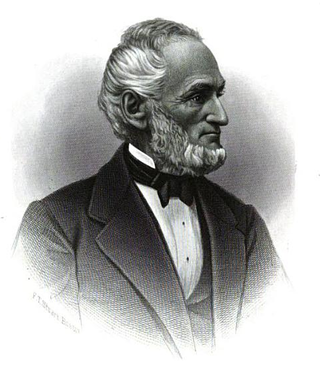| |||||||||||||||||||||
| |||||||||||||||||||||
| |||||||||||||||||||||
The 1837 Boston mayoral election saw the reelection of Whig Party incumbent Samuel Atkins Eliot. It was held on December 11, 1837. [1]
| |||||||||||||||||||||
| |||||||||||||||||||||
| |||||||||||||||||||||
| Elections in Massachusetts |
|---|
 |
The 1837 Boston mayoral election saw the reelection of Whig Party incumbent Samuel Atkins Eliot. It was held on December 11, 1837. [1]
Eliot sought reelection. Amasa Walker was the Democratic Party/locofoco nominee. Also running was former mayor Theodore Lyman II. [2]
As part of the scattering, Lyman received more than 300 votes, by one account around 1,200 or more. [2] [3]
| Party | Candidate | Votes | % | |
|---|---|---|---|---|
| Samuel Atkins Eliot (incumbent) | 3,475 | 55.57 | ||
| Democratic | Amasa Walker | 1,127 | 18.02 | |
| Scattering | Other (including Lyman) | 1,651 | 26.40 | |
| Total votes | 6,253 | 100 | ||

Amasa Walker was an American economist and United States Representative. He was the father of Francis Amasa Walker.
The Boston mayoral election of 1854 saw the reelection of incumbent mayor Jerome V. C. Smith. It was held on December 11, 1854.
The Boston mayoral election of 1856 saw the reelection of Alexander H. Rice. It was held on December 8, 1856.
The Boston mayoral election of 1858 saw the reelection of Frederic W. Lincoln Jr. It was held on December 13, 1858.
The Boston mayoral election of 1859 saw the reelection of Frederic W. Lincoln Jr. to a third consecutive term. It was held on December 12, 1859.
The Boston mayoral election of 1861 took place on Monday, December 9, 1861, and saw the reelection of Joseph Wightman.
The Boston mayoral election of 1869 saw the reelection of Nathaniel B. Shurtleff to a third consecutive term.
The Boston mayoral election of 1871 saw the reelection of incumbent Democrat William Gaston, who defeated Republican nominee Newton Talbot.
The Boston mayoral election of 1887 saw the reelection of Hugh O'Brien (a Democrat to a fourth consecutive term, defeating Republican nominee Thomas N. Hart.
The 1844–45 Boston mayoral election saw the election of Native American Party nominee Thomas Aspinwall Davis as mayor of Boston. The election took eight votes, as no candidate secured the needed majority in the first seven attempts. Incumbent Whig Party mayor Martin Brimmer was not a nominee reelection.
The 1842 Boston mayoral election saw the election of Whig Party nominee Martin Brimmer. It was held on December 12, 1842. Whig Party incumbent Jonathan Chapman was not a nominee for reelection.
The 1840 Boston mayoral election saw the reelection of Whig Party incumbent Jonathan Chapman. It was held on December 14, 1840.
The 1839 Boston mayoral election saw the election of Whig Party nominee Jonathan Chapman. It was held on December 9, 1839. Whig Party incumbent Samuel Atkins Eliot was not a nominee for reelection.
The 1838 Boston mayoral election saw the reelection of Whig Party incumbent Samuel Atkins Eliot to a third consecutive term. It was held on December 10, 1838.
The 1836 Boston mayoral election saw the election of Whig Party nominee Samuel Atkins Eliot. It was held on December 12, 1836. Incumbent Samuel T. Armstrong was not a nominee for reelection.
The 1835 Boston mayoral election saw the election of Whig Party nominee Samuel Turell Armstrong. It was held on December 14, 1835.
The 1833 Boston mayoral election saw the election of Theodore Lyman II. It was held on December 9, 1833. Incumbent mayor Charles Wells was not a nominee for reelection.
The 1832 Boston mayoral election saw the reelection of incumbent Charles Wells. It was held on December 10, 1832.
The 1831 Boston mayoral election saw the election of Charles Wells. The first vote, held on December 12, 1831, did not result in any candidate receiving the required majority of the vote, resulting in a second vote on December 22, 1831, which Wells won.
The 1830 Boston mayoral election saw the reelection of incumbent Harrison Gray Otis to a third consecutive term. It was held on December 13, 1830.